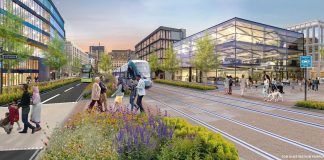Over 5,000 environmental surveys have been carried out as plans for a new tram line between Bradford and Leeds gather pace.
West Yorkshire Combined Authority aims to have “spades in the ground” on the new Mass Transit system, which will feature numerous stops between the two cities, in 2028.
At a meeting on Thursday, members will be given an update on the mass transit scheme, with members told how an extra £40 million of funding would support key works to keep the Mass Transit project on track.
The work will include further technical and environmental assessments on tram route options, as well as progressing the business case and preparing the plans to go before government decision-makers in the coming years.
The money would be released from a pot of cash already allocated to the scheme.
The full route of the tram line has not yet been revealed, but a report to Councillors from across West Yorkshire reveals that numerous surveys have been done on sites between Leeds and Bradford.
The report to a committee meeting next Thursday says: “To comply with the Mass Transit overall programme, preparation work for the Environmental Impact Assessment has been progressed, noise and air quality modelling has commenced to support these deliverables.
“Land access for 869 sites across the Leeds and Bradford lines has been agreed, and over 5,000 surveys covering bats, birds and badgers have been undertaken.”
The report says Leeds and Bradford Council will also play a key role in planning for the tram route.
“District Partners have also played a significant role in planning and land matters and assisted greatly on the integration of Mass Transit with significant regeneration opportunities and potential developments, for example, Elland Road in Leeds and the potential new Northern Powerhouse Rail station in Bradford.”
Referring to the importance of engaging with other parties during the scheme, the report says: “Consultation and engagement with all stakeholders, including our local authority partners, the Department for Transport, Members of Parliament, local Councillors, statutory consultees, stakeholders and our communities, including underrepresented groups and members of the public, is extremely important when developing a Mass Transit scheme of this scale and significance.
“Having a constructive and meaningful dialogue with those likely to be interested in or affected by a project can provide feedback on its design, allay fears and suspicions based on a lack of understanding of the scheme and help limit the number of objections once an application is made after the consultation is undertaken.”




